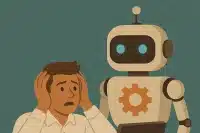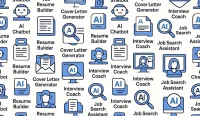The AI Revolution: Introduction
Artificial Intelligence (AI) is no longer a futuristic concept—it’s a present-day reality that is rapidly transforming the professional landscape. From automating routine tasks to making complex decisions, AI is reshaping how we work, the skills we need, and the very nature of professional careers. In this comprehensive analysis, we explore the profound impact of AI on jobs, the categories of work most affected, and what the future holds for professionals across industries.
Table of Contents
The Three Categories of Work
To understand AI’s impact, it’s essential to break down work into three broad categories:
- Thinking Jobs: Roles that require analysis, decision-making, and problem-solving, such as accountants, lawyers, and data analysts.
- Doing Jobs: Positions involving manual or routine tasks, like manufacturing, logistics, and administrative support.
- Caring Jobs: Occupations centered on empathy, human interaction, and care, including teachers, nurses, and social workers.
Hiring for Thinking, Doing, or Caring Roles?
Whether you need analysts, skilled workers, or care professionals, WhatJobs connects you with the right talent fast.
Post a Job Now →Thinking Jobs at Risk
AI’s ability to process vast amounts of data and learn from patterns puts many thinking jobs at risk. For example, AI-powered legal research tools can analyze case law faster than junior associates, while automated accounting software can handle complex financial transactions with minimal human oversight.
The Rise of AI-Related Jobs
While AI displaces some jobs, it also creates new opportunities. Demand for AI specialists, data scientists, machine learning engineers, and AI ethicists is surging. Companies are investing in upskilling their workforce to fill these roles. Explore AI career opportunities on WhatJobs to see how the job market is evolving.
Caring Jobs as the Safest
Jobs that require emotional intelligence, empathy, and human connection are less likely to be automated. Teachers, healthcare professionals, and social workers provide value that AI cannot easily replicate. As AI handles more routine tasks, the importance of these caring roles is expected to grow. Read more about careers in caring professions on WhatJobs.
The Shifting Landscape of Education
Education systems are adapting to the AI revolution by emphasizing critical thinking, creativity, and digital literacy. Lifelong learning is becoming the norm, with professionals needing to reskill and upskill throughout their careers. WhatJobs offers resources for career advice and education to help you stay ahead.
The Current Crisis for Recent Graduates
Recent graduates face a challenging job market as entry-level positions are increasingly automated. Many struggle to find roles that match their qualifications. Our in-depth report highlights the difficulties and offers strategies for navigating this new landscape.
Worried About AI Replacing Your Job?
Discover new opportunities in emerging fields. Search thousands of jobs on WhatJobs and secure your future today.
Search Jobs Now →Universal Basic Income: Policy Solutions
As AI disrupts traditional employment, policymakers are exploring solutions like Universal Basic Income (UBI) to provide financial security. UBI pilots in various countries have shown mixed results, but the debate continues as automation accelerates. Stay informed with the latest employment news on WhatJobs.
Learning from History
Technological revolutions have always disrupted labor markets, from the Industrial Revolution to the rise of computers. History shows that while some jobs disappear, new ones emerge. The key is adaptability and a willingness to learn new skills. Discover recruitment insights to help you prepare for the future.
The Path Forward
Professionals must embrace change, invest in continuous learning, and seek out roles that leverage uniquely human skills. Employers, educators, and policymakers must collaborate to ensure a smooth transition to an AI-driven economy. Visit WhatJobs for the latest job listings, career resources, and industry news.
Comprehensive FAQ
Q: Which jobs are most at risk from AI?
A: Roles involving repetitive data processing, such as bookkeeping, basic legal research, and some customer service positions, are most vulnerable.
Q: What new jobs is AI creating?
A: AI is driving demand for data scientists, machine learning engineers, AI trainers, and ethics specialists. See live AI job listings on WhatJobs.
Q: How can I future-proof my career?
A: Focus on developing skills that AI cannot easily replicate, such as creativity, emotional intelligence, and complex problem-solving. Explore career advice for actionable tips.
Q: Are there real-world examples of AI displacing jobs?
A: Yes. For instance, some law firms now use AI to automate document review, reducing the need for junior associates. Read our case study for more details.
Q: What support is available for displaced workers?
A: Many governments and organizations offer retraining programs and financial assistance. Check employment news for updates.




